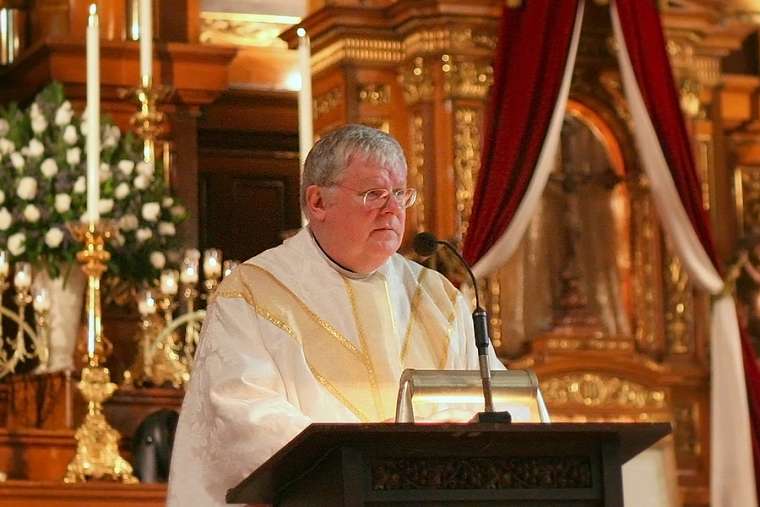CHICAGO – The religious superior of Father C. Frank Phillips, former pastor of St. John Cantius Parish in Chicago, recommended last month that Chicago’s archbishop permit the priest to return to public ministry, CNA has learned.
In a May 21 communique to Cardinal Blase Cupich obtained by Catholic News Agency, the priest’s superior recommended that Phillips “should not return to the parish as its pastor,” but supported the possibility that Phillips might exercise priestly ministry in some other setting.
Phillips, 68, has been accused of misconduct involving adult men. He was removed as pastor of St. John Cantius March 16, and prohibited from public ministry in the Archdiocese of Chicago by Cupich.
Since then, Father Scott Thelander has served as parish administrator ad interim.
Phillips, who is canonically a member of the Congregation of the Resurrection, had served at St. John Cantius parish since 1988.
In 1998, Phillips founded the Canons Regular of St. John Cantius, with the approval of Cardinal Francis George of Chicago and the Resurrectionists.
The Archdiocese of Chicago forwarded unspecified allegations to the Resurrectionists in March.
The allegations were investigated by an independent review board organized by the Resurrectionists, and by provincial leaders. The results of that investigation were forwarded to the Archdiocese of Chicago by Father Gene Szarek, superior of the USA province of the Resurrectionists, along with his own proposal for a resolution.
Szarek sent on May 21 a “votum” – an official opinion – to the Archdiocese of Chicago, in response to the findings of the review board. CNA has obtained a copy of that votum, which did not specify the nature of the allegations made against Phillips.
Citing “a certain amount of ambiguity between the allegations of the accusers and the testimony of witnesses, including Father Phillips himself,” Szarek said he would instruct Phillips to undergo a psychological evaluation, “and possible sensitivity training in the very near future.”
Szarek said further that Phillips should not return to St. John Cantius Parish as its pastor, considering both his age “and out of respect for the cardinal’s own preference.”
The superior also wrote that it “seems fair and just to restore the canonical faculties of Father Phillips” because “no civil or ecclesiastical crime had been established.”
He noted that Phillips’ accusers “thought that his removal from the parish was all that they desired.”
Szarek also wrote that since Phillips is founder of the Canons Regular of St. John Cantius, “the ideal would be his restoration as their superior general.”
The Canons Regular are incardinated in the Chicago archdiocese, and their assignments are made by the Archbishop of Chicago, Szarek noted, so “there is no fear that Father Phillips could possibly interfere in some way” with the archbishop’s decisions.
“The historical reality of his being the Founder and his ongoing provision of spiritual leadership would be salutary for all,” Szarek stated, adding that Phillips “would obviously not reside” at St. John Cantius Parish.
“If the above recommendation is unfeasible, then at least he and the Canons should not be prevented from communication.” A prohibition on communication between Phillips and the Canons Regular had not previously been reported.
Despite Szarek’s proposal, Cupich declined to allow Phillips to minister publicly. Ordinarily, a priest prohibited from public ministry is able to celebrate Mass only in private, and not able to hear confessions or celebrate other sacraments, unless a person is in immediate danger of death.
“We accept the Archdiocese’s decision that Father Phillips’s faculties for public ministry will remain withdrawn and that he not return as pastor of St. John Cantius and as Superior of the Canons Regular of St. John Cantius,” Szarek wrote in a June 24 letter to the parishioners of St. John Cantius parish.
Paula Waters, a spokeswoman for the Archdiocese of Chicago, told the Chicago Tribune June 25 that though Phillips had not been found to have violated civil or canon law, there was other information that justified barring him from exercising public ministry.
“There are standards for behavior,” Waters told the newspaper.
Stating that the review board recommended that Phillips not return to St. John Cantius as pastor “and on other factors, the cardinal decided that his faculties to minister would remain withdrawn,” she said.
When asked about the removal of Phillips’s faculties, a Chicago archdiocese spokeswoman told CNA June 26 only that “it was recommended that Father Phillips not return to ministry at St. John Cantius” in the Resurrectionists’ investigation report.
In his letter informing the St. John Cantius community of Cupich’s decision, Szarek wrote: “While we know this news will disappoint some of Father Phillips’s supporters, we hope everyone will come to understand that this process was conducted with prayerful deliberation and sincere compassion.”
Protect our Priests, a group formed to support and assist Phillips had issued a statement June 20 saying that Phillips had been “exonerated,” adding the review board “concluded that Father Phillips has not violated any secular criminal, civil or canon law.”
Protect our Priests stated that the review board, consisting of three leaders from the Chicago area who are not members of St. John Cantius parish, interviewed “the detractors and several witnesses, persons who personally know the accusers, and other individuals who came forward to testify in defense of Father Phillips’s integrity.”
The group added that Cupich had directed that members of the Canons Regular of St. John Cantius not be interviewed by the board.
The group stated June 20 that “We … remain confident that in this process, justice and truth will prevail over the mendacity, falsehoods, spitefulness and malevolent connivance from which this unpleasant episode originates; and that the accusers, who recklessly have besmirched their own reputations in this matter, will too choose to make themselves ‘free’, by each of them individually presenting an unconditional retraction.”
St. John Cantius parish was founded in 1892 by the Congregation of the Resurrection, according to the church’s website, and each of its pastors has been a member of that congregation.















